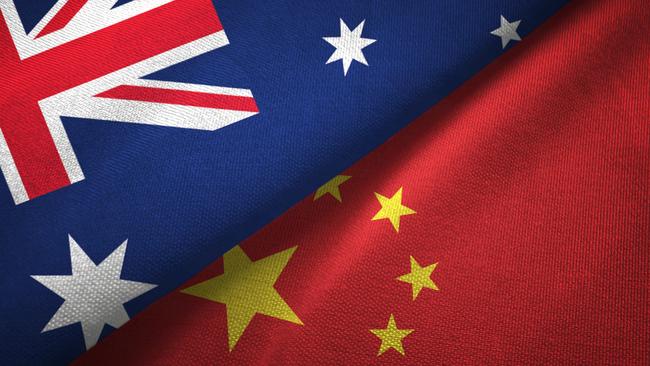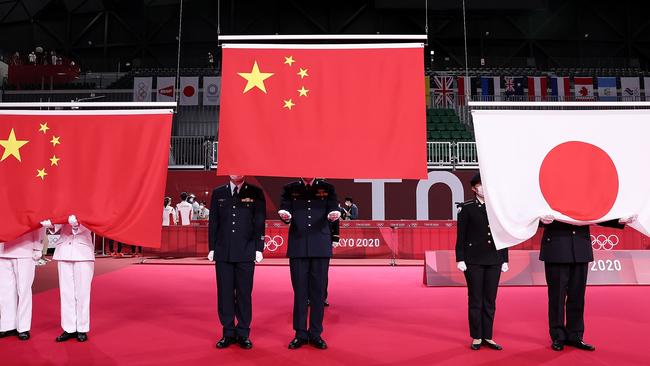
One idea already being floated is whether the Games can provide a breakthrough in the long standing Australia-China political tensions, with some representation of both political and business leaders.
The idea was raised last week at a video conference of the Australia China Business Council by former federal sports minister Warwick Smith, whose bosses – Seven’s Kerry and Ryan Stokes – have been enjoying the unique combination of broadcasting a summer Games in the Australian time zone at a time when much of the population have been told to stay at home.
The former chair of the Australia China Council, Smith can see the potential for sports diplomacy.
As he points out, Australia and China both share a love for sport and the Olympics, with Australia set to become one of the few countries to host a third Games and China set to host its second Games.
One of the features of the Games just finished in Tokyo is the confirmation of the rise of sport in Asia, with both China and Japan now becoming Olympic powerhouses, alongside the US, Europe and Russia.
Austrade actively used the Beijing Games in 2008 as a meeting opportunity for Australian and Chinese business people.
And those with some sense of Western and Chinese diplomacy with remember the famous “ping pong diplomacy” between Washington and Beijing.
A visit by the US table tennis team to China in 1971 paved the way for the end of US sanctions against the country, and a visit by Henry Kissinger and then President Nixon the following year led to the opening up of relations.
Relations between Australia and China started to deteriorate under the Turnbull government and have worsened under Scott Morrison.
But as political ties have deteriorated – due to actions by both sides – it has become clear that people-to-people and business ties remain strong.
It is critical for Australia to maintain connections at many levels with the most important country in our region, while still voicing concerns about policies it doesn’t like, including Xinjiang and Hong Kong.
Reasons include the importance of China in the region, the huge potential for trade, the importance of keeping China “inside the tent” rather than going out of one’s way to make it an enemy, and the more than a million people in Australia of Chinese descent.
Countries in Asia including Japan and Singapore have managed to have their differences with China yet still maintain a broad range of channels of communication.
The Xi administration has become increasingly powerful, nationalistic and aggressive, but it is important to maintain ties with a range of other players in the country.
And it would be a mistake to believe that Xi’s views are universally shared among Chinese leaders.
When it comes to China, political interest can override business interests.
As Trade Minister Dan Tehan acknowledged soon after taking on the role late last year, when he was unable to contact his counterpart in China, the chance for improved ties may lie with the business community.
Former Sydney Games bid chief executive Rod McGeoch recently called for the revival of the Olympic business club, which worked well at the 2000 Games in Sydney, arguing that Australia should use its role in hosting sporting events including the 2032 Games in Brisbane to promote more global business ties.

Smith’s comments come as the Australia China Business Council is openly discussing a host of ways to thaw relations with China.
The council has just watched with some envy as its British counterpart got China’s Premier Li Keqiang to address an online conference last month.
Led by King & Wood Malleson’s David Olsson, the ACBC is also keen to organise a business delegation to China as soon as borders reopen.
There is still strong interest among Chinese consumers for Australian goods despite trade barriers being thrown in their way, with Chinese consumers liking Australia’s clean, green image and having confidence in their high quality standards.
Hong Kong-born businessman Albert Tse, whose family has strong links with mainland China, says his friends in China are always asking him to send Penfolds wine.
Australia’s once lucrative $2bn a year wine exports to China have all but stopped in the wake of Beijing’s imposition of punitive tariffs last November.
Tse noted that some of them have discovered it is still possible to buy Penfolds in China, but from Treasury Wine Estate’s vineyards from California’s Napa Valley, thanks to TWE’s global operations.
He points out that Penfolds’ Australian-made Bin 407 is now being replaced with its Bin 704 from California in China.
“Australians are a creative bunch and Aussie business people are innovative and resilient,” says Tse, who lived in China for several years, including a role with Macquarie Bank in Beijing, and more recently in Shanghai before coming back to Australia to establish his investment fund Wattle Hill Capital.
“Dialogue is probably more important when there are differences. Given it appears there is a lack of official government to government dialogue, non-government interactions in areas of mutual benefit like trade and commerce are even more important.”
As he points out, China is the world’s largest trading partner to the US, the European Union and ASEAN as well as Australia.
“Business people will always maintain trading links regardless of the tensions between Canberra and Beijing,” he says.
Tse points to the comments of Singapore’s Prime Minister Lee Hsien Loong, who said recently of his country’s ties with China: “You don’t have to become like them, neither can you hope to make them become like you. You have to be able to work on that basis, that this is a big world in which there are different countries, and work with others who are not completely like-minded but with whom you have many issues, where your interests do align.”
While there are those who subscribe to the gloomy predictions of Graham Allison’s “Destined for War”, the attempts by the business community to keep ties with China is one constructive way of making progress.
The Beijing Winter Games will provide a challenge for China to drop some of its nationalistic aggression which is not going down well in many Western countries.
Can the sports diplomacy of 1971 work in modern day China 2022?
It’s worth a try.





With the Tokyo Games now over, and proving to be far more successful than most people had imagined, the focus will soon shift to the Winter Olympics in Beijing next February.